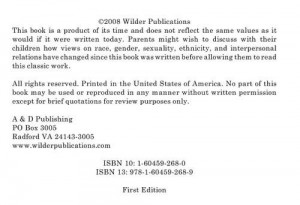A small publisher that specializes in reprinting classics believes the U.S. Constitution should come with a warning. Since 2008, Wilder Publishing has published this caution in its version of America’s founding document:
“This book is a product of its time and does not reflect the same values as it would if it were written today. Parents might wish to discuss with their children how views on race, gender, sexuality, ethnicity, and interpersonal relations have changed since this book was written before allowing them to read this classic work.”
 The warning stirred up a firestorm of protest about a year ago on the Internet – with appalled readers calling for a boycott. The company maintained absolute silence – which it continues.
The warning stirred up a firestorm of protest about a year ago on the Internet – with appalled readers calling for a boycott. The company maintained absolute silence – which it continues.
The company also offers the warning on its version of the Federalist Papers, Thomas Paine’s Common Sense, Teddy Roosevelt’s The Rough Riders and Benjamin Franklin’s Poor Richard’s Almanack.
The company sells the books on Amazon.com, which displays the front cover and page 3 with the controversial disclaimer – for which Wilder offers no apology … or comment.
 The company’s website provides no phone number or physical address. It is in the business of “publishing print-on-demand books (mostly self-help and public domain reprints).”
The company’s website provides no phone number or physical address. It is in the business of “publishing print-on-demand books (mostly self-help and public domain reprints).”
“Print-on-demand books” means that such companies run off their books one at a time whenever they get an order. Technology has revolutionized the publishing business these days. Whereas in years past, it was seldom economical to print fewer than 1,000 books, it’s now feasible to do books one at a time. Basically, the books run off on a high-tech computer printer that also prints an attractive color cover and even binds the book so that it looks like a regular paperback.
Amazon also offers Wilder’s electronic Kindle version of the books.
Although warning labels are usually posted to protect a company from potential lawsuits, constitutional attorney Noel Francisco says such a disclaimer has no legal benefit. Francisco says it is more likely to have the opposite effect: people refusing to buy a book because they are offended by the disclaimer.
“By putting on the warning,” said Francisco, “you’re making controversial something that’s not controversial.”

